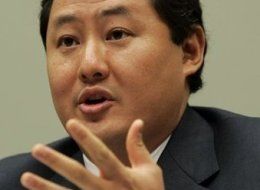
Friday’s Wall Street Journal featured an Op-Ed by former George W. Bush Justice Department official and de facto war criminal John Yoo. Yoo is most famous for authoring a series of memos which advocated the torture of “War on Terror” detainees by doing an end-run around the Constitution and international conventions against torture.
For a summary of Yoo’s crimes, you can check out Glenn Greenwald’s piece at Salon or Jennifer Van Bergen’s at Counterpunch, but here I would like to take issue with his extremely deceitful quoting of Alexander Hamilton.
In making the Constitutional case for Obama’s missile strikes against Libya, Yoo cites Federalist 74, written by Hamilton, to support his argument. Here’s how he puts it:
“For once, Mr. Obama has the Constitution about right. As Alexander Hamilton wrote in Federalist 74, ‘The direction of war implies the direction of the common strength, and the power of directing and employing the common strength forms a usual and essential part in the definition of the executive authority.’ Presidents should conduct war, he wrote, because they could act with ‘decision, activity, secrecy, and dispatch.’ In perhaps his most famous words, Hamilton wrote that ‘Energy in the executive is a leading character in the definition of good government….It is essential to the protection of the community against foreign attacks.’”
Yoo’s presentation of Hamilton’s arguments about war powers is dishonest and/or incompetent, which is especially terrible because Yoo is a law professor at the University of California at Berkeley. What he’s implying here is that Hamilton advocated a unilateral Executive war-making authority. But let’s take a look at what Hamilton wrote in Federalist 74 in context.
“The President of the United States is to be ‘commander-in-chief of the army and navy of the United States, and of the militia of the several States when called into the actual service of the United States.’ [Emphasis Hamilton’s]…Of all the cares or concerns of government, the direction of war most peculiarly demands those qualities which distinguish the exercise of power by a single hand. The direction of war implies the direction of the common strength; and the power of directing and employing the common strength, forms a usual and essential part in the definition of the executive authority.”
As you can (but Yoo can’t) see, Hamilton is saying that the prosecution of war is best left to a single hand—the president—not the decision to wage war itself. And who calls the military “into the actual service of the United States”? To answer that, let’s see what Hamilton said earlier in Federalist 69:
“The President will have only the occasional command of such part of the militia of the nation as by legislative provision may be called into the actual service of the Union. [Emphasis mine]….The President is to be commander-in-chief of the army and navy of the United States. In this respect his authority would be nominally the same with that of the king of Great Britain, but in substance much inferior to it. It would amount to nothing more than the supreme command and direction of the military and naval forces, as first General and admiral of the Confederacy; while that of the British king extends to the declaring of war and to the raising and regulating of fleets and armies—all which, by the Constitution under consideration, would appertain to the legislature. [Emphasis mine]”
As if advocating torture weren’t bad enough, John Yoo also sees fit to drag the name of Alexander Hamilton into the mud where his own perverted views of the Constitution reside.
- Max

No comments:
Post a Comment